10th East Asia Tea Culture Symposium & 10th Panel Discussion on Culture and Peace in East Asia
| The East Asia Tea Culture Symposium and Panel Discussion on Culture and Peace in East Asia which, as directed by Urasenke Daisosho Dr. SEN Genshitsu, have been organized by Urasenke headquarters since 2004 took place October 30 and 31, 2015. It was the 10th time for this pair of events to be held, and the first time for them to be held in Kyoto. The venue for both was Ritsumeikan University's Sujaku Campus, and there were approximately 420 attendees in all. |
 |
| October 30 The Symposium, on the theme "The Spirit of the Tea of East Asia: Its Relation to Confucianism and Daoism," took place this day. At the opening ceremony, Dr. Sen and the Chairman of Ritsumeikan University, NAGATA Toyo'omi, gave welcoming speeches as the representatives of Urasenke and Ritsumeikan, the hosting organizations. |
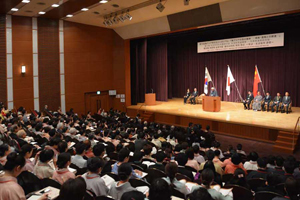 |
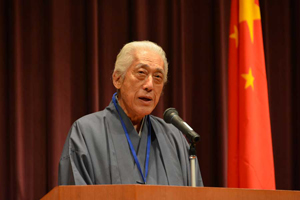 |
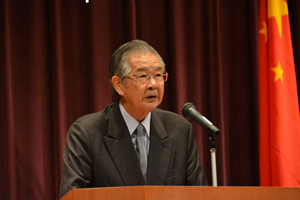 |
| Urasenke Daisosho Dr. SEN Genshitsu | Ritsumeikan University Chairman NAGATA Toyo'omi |
| There were congratulatory speeches by Kyoto Prefecture Vice Governor YAMAMOTO Shuichi, Kyoto City Mayor KADOKAWA Daisaku, Director KIM Hyeon-hwan of the Korean Culture Center attached to the Embassy of Korea in Tokyo, and Counselor CHIN Zheng of the Chinese Culture Center attached to the Embassy of China. Also, in that Urasenke and the Busan University of Foreign Studies (BUFS) in So. Korea recently signed an International Exchange Agreement to promote the study, practice, and spread of Chado Culture, BUFS Chairman PAIK Sungae and President CHUNG Haelin were in attendance, there was a presentation ceremony for the official Document of Agreement, and President Chung presented a speech. |
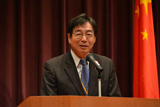 |
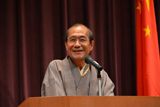 |
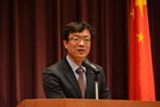 |
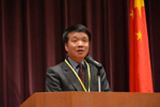 |
| Kyoto Prefecture Vice Governor YAMAMOTO Shuichi |
Kyoto City Mayor KADOKAWA Daisaku |
Korean Culture Center Director KIM Hyeon-hwan |
Chinese Culture Center Counselor CHIN Zheng |
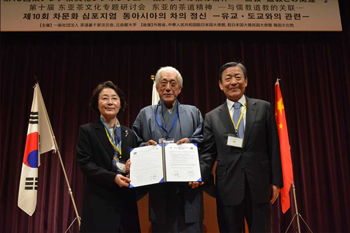 |
| BUFS Chairman PAIK Sungae, Urasenke Daisosho Dr. Sen, and BUFS President CHUNG Haelin holding the Document of Agreement |
| Two keynote speeches were then delivered; the first, by Daisosho, and the second, by Prof. PENG Lin of the Center for Chinese Ritual Studies at Tsinghua University, Beijing. Daisosho, in his talk, commented on the famous statement, "With the roots established, the way grows" (from The Analects), and also explained about the importance of modesty, which chado teaches. Prof. Peng spoke on "The Confucianist's Manners and Japan's Chado." He explained about the function of manners in Chinese society, and pointed out the similarities and differences seen in chado. |
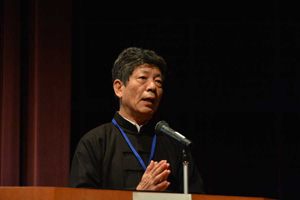 |
| Prof. PENG Lin delivers a keynote speech. |
| Paper presentation/discussion sessions followed, with ZHANG Jianli (Professor, Chinese Academy of Social Sciences) acting as moderator. The papers were as follows: Paper I: "Chado and Meditation," by LI Gidong (Professor, Sungyunkwan University, So. Korea). Discussant: TSUTSUI Hiroichi (Professor, Kyoto University of Art & Design). Paper II: "Daoism and Tea, Confucian Codes of Conduct and Tea," by KAJI Nobuyuki (Fellow, Ritsumeikan University). Discussant: PARK Jeon Yull (Professor, Chung-Ang University, So. Korea). Paper III: "The Link in Human Relations in East Asian Society," by SHANG Huipeng (Professor, School of International Studies, Peking University). Discussant: SEKINE Hideji (Director and Professor, Traditional Culture Research Center, Heian Jogakuin St. Agnes' University, Japan). Paper IV: "Tea and Courtesy," by NAKANISHI Susumu (Professor Emeritus, Kyoto City University of Arts). Discussant: XU Yiping (Chief Administrator, Beijing Japan Studies Research Center). Summation: ZHANG Jianli |
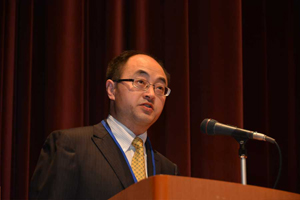 |
| ZHANG Jianli, Moderator |
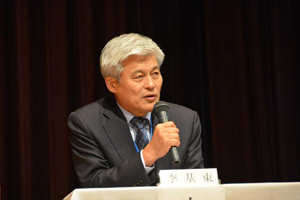 |
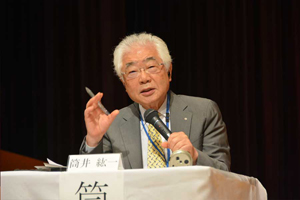 |
| LI Gidong | TSUTSUI Hiroichi |
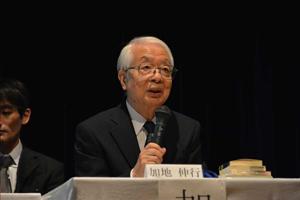 |
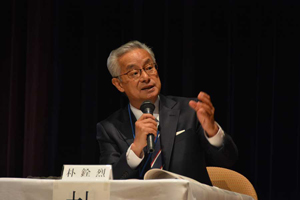 |
| KAJI Nobuyuki | PARK Jeon Yull |
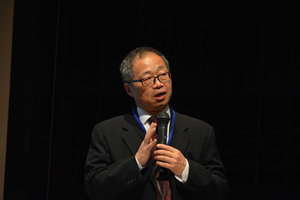 |
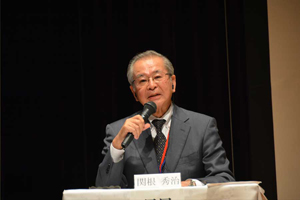 |
| SHANG Huipeng | SEKINE Hideji |
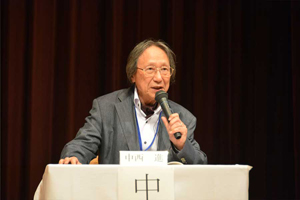 |
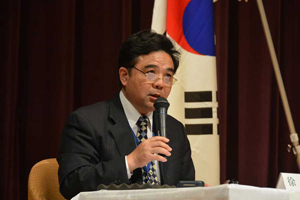 |
| NAKANISHI Susumu | XU Yiping |
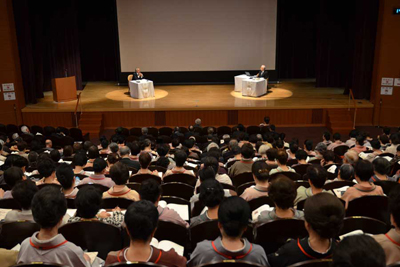 |
| In the evening, at the Kyoto Hotel Okura, Dr. Sen conducted a kencha-shiki, in which he offered a bowl of tea before the flags of Japan, So. Korea, and China, praying for peace among the three nations. Then followed a banquet hosted by him. Representing the special guests, President OHYA Minoru of the Doshisha School Corporation gave a speech, and then BUFS President CHUNG Haelin raised a toast. |
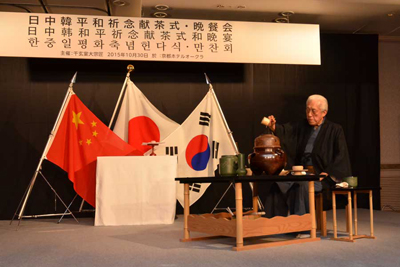 |
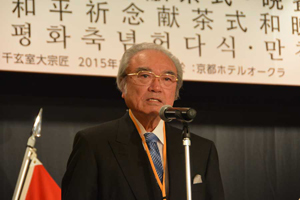 |
| Doshisha School Corporation President OHYA Minoru |
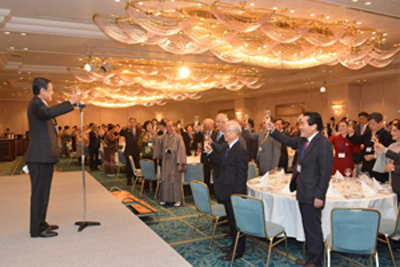 |
| October 31 At the opening ceremony for the Panel Discussion on Culture and Peace in East Asia, representatives of the hosting organizations, including Dr. Sen (Urasenke and the UN Association of Japan), Vice-President WATANABE Kozo of Ritsumeikan University, and Vice-President WANG Xiuyun of the China-Japan Friendship Association gave welcoming speeches, and as special guest, Japanese politician YAMADA Hiroshi presented a congratulatory speech. |
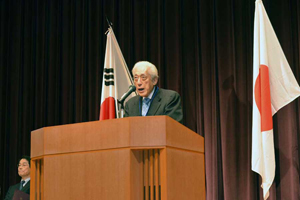 |
| Dr. Sen speaks at the opening ceremony |
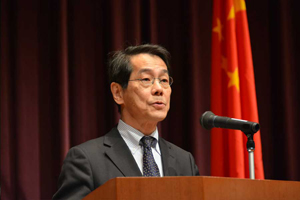 |
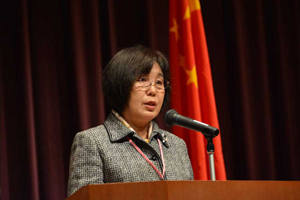 |
| Ritsumeikan University Vice-President WATANABE Kozo |
China-Japan Friendship Assn. Vice-President WANG Xiuyun |
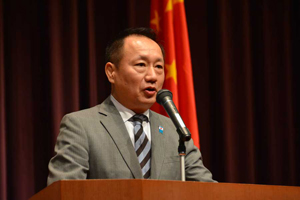 |
| YAMADA Hiroshi |
| A keynote lecture was given by KIM Yong Woon, former Korea-side Chairman of the Korea-Japan Cultural Exchange Council. He spoke on "Chado and the Peace of Northeast Asia." In closing, he proposed the establishment of a "World Tea Day," when tea people everywhere, all at the same time, would think about Peace as they enjoyed tea in their own particular setting. As guest speaker, President MURATA Koji of Doshisha University, Japan, gave a speech about the need for people in humanistic fields such as chado to cultivate their capacity to accept all kinds of cultural differences. |
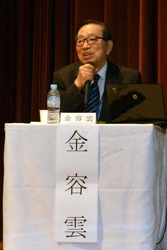 |
| KIM Yong Woon delivers keynote lecture |
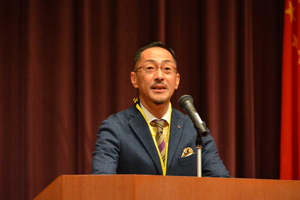 |
| Guest speaker MURATA Koji |
| The panelists were KATO Chihiro (Professor, Doshisha University Graduate School), TANG Yongliang (Vice Chief, Chinese Academy of Social Sciences Japan Research Center Culture Research Department), PARK Myeong Heum (Professor, BUFS), and ZHOU Weisheng (Professor, Ritsumeikan University). CHUNG Kuchong (Advisor, Dongseo University Japan Center, So. Korea) was the moderator. |
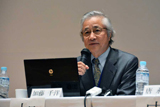 |
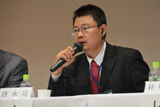 |
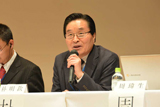 |
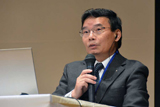 |
| KATO Chihiro | TANG Yongliang | PARK Myeong Heum | ZHOU Weisheng |
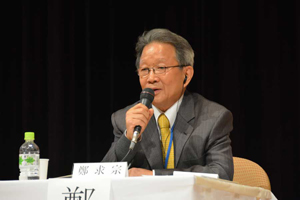 |
| CHUNG Kuchong, Moderator |
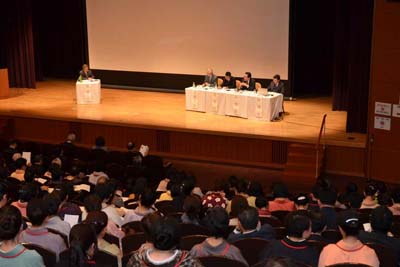 |
| At the closing, to commemorate the 10th Symposium and Panel Discussion, a "Culture and Peace" Kyoto Resolution was read in Japanese, Chinese, and Korean, by three young students of those countries, and the resolution was adopted by unanimous consent. |
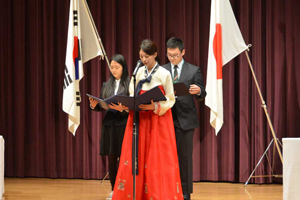 |
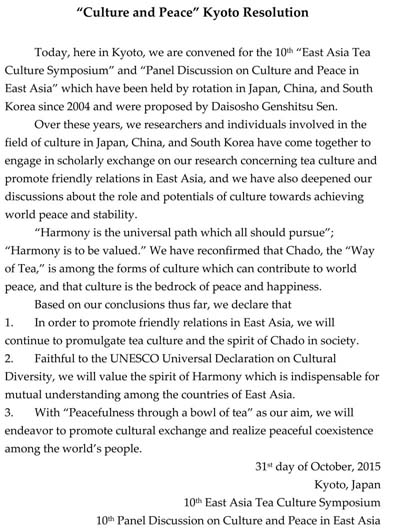 |
| HOME |